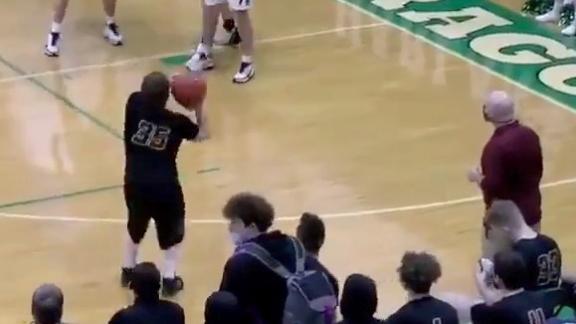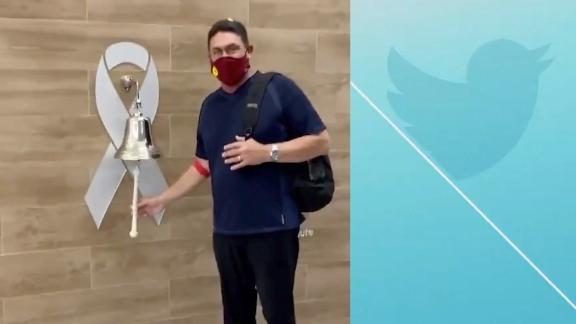Think being a ball boy at the U.S. Open, which begins today, is hard? Try serving food in one of the 90 luxury boxes at Arthur Ashe Stadium.
A brochure from Levy Restaurants, a Chicago-based conglomerate that handles all the catering at the Open, tells prospective workers that they're expected "to commit for the entire tournament and must be available to work both the day and evening sessions," which can go well past midnight.

But don't try sitting down if your legs get tired. "Suite attendants are NOT permitted to sit on suite furniture at ANY time, even with the host permission," the guidelines sternly state. And as far as catching a glimpse of the match, fuhgedaboutit. "Attendants may NOT stand in the outside seating terrace to view tennis. The only time [they] are permitted to be on the terrace is when bussing tables or assisting with beverage delivery. At no time may a suite attendant eat in the suite."
The guidelines go on to break down every detail of how the waiters must dress and act, from wearing "appropriate undergarments" to making sure the guests "[have] a beverage in front of them at all times."
Heaven forbid that you aren't around when your guest wants that second order of shrimp scampi. As this 2008 employment contract warns, "If for some reason you are not able to cover your assigned suite there will be a fee for any coverage by management."
The brochure and contract are evidence in a federal class action suit that has been filed by a part-time actor named Daniel Yahoras, who has worked every Open since 2000 and says it's like prison duty. His suit claims that suite attendants are automatically docked for substandard gruel and had their pay capped at $170 per day last year even though they worked considerably more than 40-hour weeks.
The litigation has already borne some fruit. Amerivents, the agency that hires waiters for Levy, recently agreed to settle a New York Department of Labor probe by promising to pay out $185,247 in overtime claims to suite attendants who worked from 2007 to 2009.
But the most far-reaching claim might have to do with the fact that Levy tacks on a whopping 21 percent service charge that never seems to trickle down to the waiters. Besides suing for U.S. Open suite attendants, Yahoras' attorney, Judith Spanier, has filed another class action suit, in Fulton County, Ga., on behalf of Levy attendants who work at Philips Arena, the Georgia Dome and Atlanta Motor Speedway.
In the meantime, Yahoras is planning on being back at the Open this year. "He needs the money," Spanier says.
So if you happen to be lucky enough to sit in one of those luxury boxes, don't forget to tip your waiters.
Blasberg details come into focus
The fuzzy case of Erica Blasberg is getting clearer by the minute.
Last week, police in Henderson, Nev., released this affidavit detailing what happened in the two days leading up to the golfer's May suicide. The affidavit, which led to the arrest of her doctor, Thomas Hess, on obstruction of justice charges, goes further than anything we had yet seen to support the claim of Blasberg's father, Mel, that "there was more than a patient-doctor relationship there."
Although it's been widely reported that Hess admitted removing an alleged suicide note, as well as prescription drugs, from Blasberg's bedroom when he found her body, other key details received less attention.
For instance, after the pair left the M hotel and casino, where they watched sports on May 7, Blasberg texted Hess from her car, saying she wanted him to follow her home. His answer: "You know that can't happen. You know I have to go home."
The next day, May 8, he went to the Galleria to buy a phone at T-Mobile to call Blasberg, according to the affidavit. As Hess recalled to police, she sounded so drunk that he drove to her house, where he found her with bottles of booze all around. By his account, he spilled out what he thought was vodka and Southern Comfort, got her to take a shower, watched some TV, then left to go back home.
The next morning, the doctor tried calling Blasberg but got no answer. That's when he went to her house and found her lying on the bed in a black robe with a garbage bag over her head, secured by a rubber band. As the affidavit notes, "[Her] eyes were closed and her mouth was open. … A white dust mask with yellow strings was covering her mouth and nose."
When the police arrived, Hess told them that he had ripped the bag off her head and taken her pulse as soon as he found her. At that point, the cops searched his 2008 black Mercedes and found "two folded white pieces of paper bearing apparent handwriting" and a half-used 30-pack of Xanax, which he said she apparently had bought on a recent trip to Mexico.
Asked why he acted the way he did, Hess replied: "I have no idea. I mean that -- that whole thing was a -- was a fuzz for me."
What's fuzzy for him is finally becoming clear to the rest of us.
File under …
• A headline steroid prosecution came to an abrupt end last week when the owner of an online pharmacy in Mobile, Ala., got sentenced to 10 years after being convicted of 130 drug-related counts. A federal court judge agreed with prosecutors who called Samuel Kelley II a steroid "kingpin" for selling 2,465,701 dosage units of the drug from March 2003 to August 2006 to customers without valid prescriptions. The Applied Pharmacy Services customers mentioned in MLB's Mitchell report included Jose Canseco, Jerry Hairston Jr., John Rocker and David Bell. How much will the case put a dent in the thriving black market in online steroid sales? This report from CNN suggests that the feds are just warming up.
• Interesting drug testing case in California: According to The Sacramento Bee, three appeals court justices seem to be leaning toward striking down random drug testing in high school classes that have nothing to do with sports. Among them, agricultural biology, where students have to raise a hog. "Since the results of the tests are never made public, how do they act as a deterrent?" one of the judges asked a lawyer in the case during a recent hearing. The better question: If you take steroids, how does that help you raise a hog?








